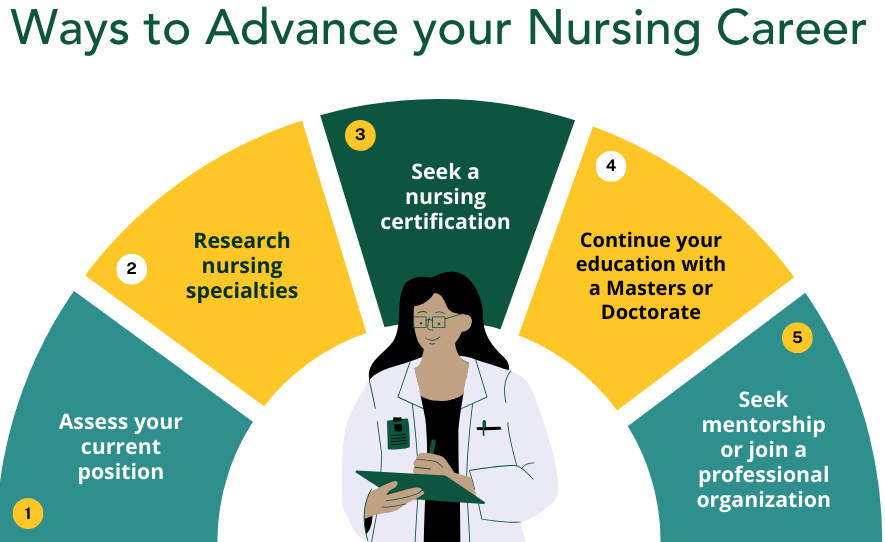
Nursing field is full of opportunities for you to develop your career whether you stay in the same clinical setting or aiming to climb the ladder in your nursing career, think of education as the solid principle upon which your ambitions are built. The right degree is not only a certificate, but also is your golden ticket to specialized roles, leadership positions, and, of course, a healthier paycheck. In my opinion, A Bachelor of Science in Nursing (BSN) is a great starting point, providing comprehensive training that many healthcare institutions look for in their staff.
Furthermore, going higher for a Master of Science in Nursing (MSN), Doctor of Nursing Practice (DNP), or even a PhD in Nursing can open greater doors. Advanced degrees can lead to positions where you are not only part of the healthcare system – but also you are shaping it.
Advance your nursing education is not only showing by degrees but also proving your expertise. Specialty certifications in areas such as cardiology, critical care, oncology, and pediatrics show that you are not only committed – but also you are competent and up to date with the latest knowledge in nursing care. These certifications speak volumes to your employers and peers, setting you apart in the competitive field of nursing.
Therefore, every new certification, you are not only enhancing your resume, but also you are building a staircase to your next huge opportunity. And that is all about experience. Working in a variety of clinical settings, honing leadership skills, and volunteering – these experiences shape you into the nurse in charge who make a real difference. That’s what we’re going to explore next.
Gaining Experience Through Diversity and Leadership
In my opinion, the richness of experience in nursing comes from working across a spectrum of clinical environments. By embracing diverse settings, you’re not only illustrating your versatility but also broadening your skill set. From busy hospitals to quiet community health centers and intimate home health care scenarios, each setting is unique. You understand that handling a variety of patient needs and team dynamics enhances your adaptability and translates into a more advanced career profile.
This is the introduction of leadership roles. Whatever your roles are whether a nurse in charge, a nurse manager, or a clinical coordinator, taking the load at some capacity can significantly hone your management and supervisor skills. Demonstrating your capacity to lead is an advantage when your manager is considering candidates for promotions or advanced roles. It shows a willingness to take responsibility and an ability to guide and motivate others.
Beginning with either minor or major initiatives is always an encouraging start. The smaller roles such as volunteering for committees, helping with special projects, or participating in community health initiatives – can have a huge impact. These opportunities allow you to demonstrate leadership and commitment without affecting your current responsibilities. Furthermore, they are excellent ways to trial your leadership style in a real environment
In alignment with progressing through varied experience and leadership, you can always choose the most suitable role with you in the later time. The next paragraph will focus on the power of networking and professional development, and how these elements are critical in empowering your nursing career.
Building Professional Networks and Continuing Development

To expanding your nursing career, networking and professional development are crucial steps to advance it and the below paragraphs will explain to you how.
Joining professional organizations such as the American Nurses Association (ANA) or specialty-specific associations opens numerous doors. All these networks such as new job openings, cutting-edge research, and educational resources – all while connecting with peers who can share their experiences and advice.
Considering staying on top of the latest advancements in nursing, attending conferences and workshops is a must. Not only do these events showcase new insights and technologies, but they also offer the perfect backdrop for building professional relationships and exchanging ideas.
What’s about mentorship? You can either seek guidance from professionals or senior colleagues or consider mentoring newcomers. Sharing your knowledge as a mentor is incredibly rewarding and hones your own leadership skills.
Keep it in mind, your growth in the nursing field is not confined to clinical practice. Exploring advanced roles and even non-clinical careers can also be intriguing and fulfilling pathways. So, in the next section, we will explore some of these dynamic opportunities that lie beyond the bedside.
Beyond Bedside Care: Broadening Your Nursing Horizons
A nursing career is not only limited in the hospital environment as you develop your skills and expertise, but you are also going to explore advanced and non-clinical roles that can reshape your career trajectory.
Regarding nurses in clinical environments, becoming a Nurse Practitioner (NP) or Clinical Nurse Specialist (CNS) offers the chance to specialize further and even lead healthcare teams. Nurse Practitioners excel in family practice, geriatrics, and a variety of other specializations, providing much-needed care and sometimes even standing in for primary care physicians.
What’s about Nurse Anesthetists and Nurse Midwives who play pivotal roles in surgical and birthing environments, respectively. These are highly specialized areas that demand both advanced knowledge and the ability to work closely with surgical teams or to support mothers through the childbirth process.
Regarding education or research, becoming a Nurse Educator or Nurse Researcher could be the perfect fit. In these roles, you will be shaping the future of nursing by teaching the next generation or by discovering new best practices through cutting-edge research.
On the other hand, if you are interested in the operational side of healthcare, roles in healthcare administration offer a chance to make a significant impact by managing facilities and improving systemic healthcare processes.
In your journey, never underestimate the power of staying informed. Keeping up with the latest industry trends through journals and online resources is crucial. It keeps you in the loop and ready to adapt to new advancements in healthcare.
In conclusion, advancing your nursing career is about more than accumulating years on the job; it is a continual growth, seizing opportunities, and being part of the evolving landscape of healthcare. With the right mix of education, certification, experience, and networking, you can reach new professional heights and find fulfillment in various fields of nursing.
